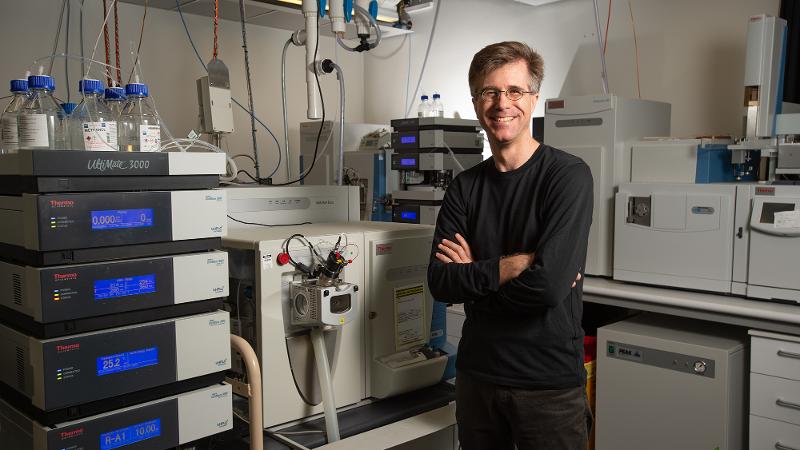
Australian Research Council (ARC) Laureate Fellow Professor Christopher Barner-Kowollik’s career’s work inspired by a lifelong fascination with light has been rewarded with a prestigious international award.
QUT’s Deputy Vice-Chancellor and Vice-President (Research and Innovation) has been named as the 2020 recipient of the Macro Group UK Medal for Outstanding Achievement, a major award for a scientist from any country who is recognised internationally for outstanding achievements in polymer chemistry.
Professor Christopher Barner-Kowollik, a world-leading soft matter nanotechnologist, said he was very honoured to join the distinguished group of previous award recipients of respected scientists from around the world.
As this year’s award recipient, Professor Barner-Kowollik was due to receive a silver medal and deliver a lecture on his work at an event at Imperial College in London in September, but that has been postponed to March next year because of the COVID-19 pandemic.
Professor Barner-Kowollik said his lecture would focus on a topic that has driven his curiosity throughout his career: the power and possibilities of light in macromolecular chemistry.
“A recurring theme in my research has been light, the use of light to understand chemical processes, inventing reactions that function with light and to design advanced programmable materials using light,” Professor Barner-Kowollik said.
“That’s been the enduring constant from my PhD thesis all the way to my Laureate fellowship.”
In 2017, Professor Barner-Kowollik was awarded an ARC Australian Laureate Fellowship worth more than $3 million to investigate how monochromatic light provided by lasers could be used to program functional interfaces and soft matter materials.
Highlights of his recent work includes fundamental research published in Nature Communications and the Journal of the American Chemical Society on how light controls the formation of molecules.
“Following on from this molecular in-depth understanding, we are exploring how light can be used in the best possible way to generate advanced materials with programmable properties for applications ranging from medical materials to light emitting displays,” Professor Barner-Kowollik said.
“The cool thing about light is that it can switch a chemical reaction on and off quite easily, basically enabling remote control chemistry.
“You can also point light at specific regions of matter and only create a change where the light is pointed.
“One of the key drivers in our work is making inks for Direct Laser Writing – a special kind of 3D printing which we call laser lithography, allowing us to print micron-sized structure, really small structures that are invisible to the eye, even down the nanometer range.
“Another example I am particularly proud of, published in the Journal of the American Society, is where we recently invented a new material class we termed light stabilized dynamic (LSD) materials.
“What these materials do is that they retain their shape and form as long as the light shines on them.
“In darkness, the material liquefies again, which is a critical property for erasing support structures in 3D printed material or the design of macromolecules whose function – for example catalysis – is controlled by light.”
Professor Barner-Kowollik said his interest in light had been a constant in his life.
“Light is such a fascinating medium,” he said. “It’s got the dual character of wave and particle at the same time, so it’s philosophically highly interesting, too.
“And that's what drew me in it into it.”
Media contact:
Rod Chester, QUT Media, 07 3138 9449, rod.chester@qut.edu.au
After hours: Rose Trapnell, 0407 585 901, media@qut.edu.au




